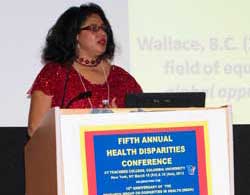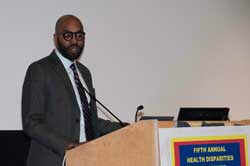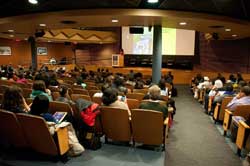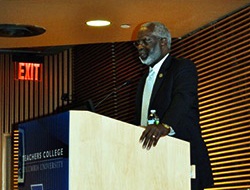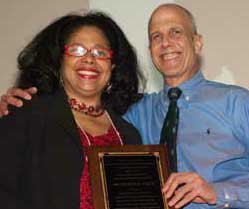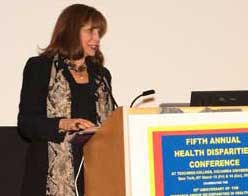Harnessing Culture to End Health Disparities
By James Reisler
“This gathering celebrates a new global approach toward equity in health. We want to foster a 21st-Century global rights movement, one that drives toward new models of health care and training. Key to this vision is the shift away from ‘blame-the-victim’ and ‘deficit-oriented’ research and toward research that identifies adapting coping to cultural differences.”
With those words, Barbara Wallace, Professor of Health Education in TC’s Department of Health and Behavior Studies, opened “From Health Inequity to Equity in Health,” a two-day conference held at Teachers College in mid-March.
Keynoted by former U.S. Surgeon General Dr. David Satcher, the event – the College’s fifth annual conference on health disparities – was highlighted by the launch of TC’s new Center for Health Equity and Urban Science Education (CHEUSE). The Center, co-directed by Wallace and Christopher Emdin, Assistant Professor of Science Education, champions the use of innovative, multimedia strategies to research and build evidence-based approaches for health disparities, their connections to school success and implications for policy.
Emdin and Charles Basch, TC’s Richard March Hoe Professor of Health Education, joined Wallace and Satcher in calling for “a new paradigm for understanding health disparities.” There also were talks by Robert Fullilove, Associate Dean for Community and Minority Affairs, Professor of Clinical Sociomedical Sciences and the co-director of the Community Research Group at Columbia's Mailman School of Public Health, and C. Virginia Fields, former Manhattan Borough President.
The conference also featured roundtables on topics ranging from the crisis of high rates of infant mortality in the African-American community to the obesity epidemic among school children and incorporating components from hip-hop culture into public health.
Satcher called on health and education practitioners to take charge in the effort to eliminate health disparities, arguing that effective leaders are found all levels of the health care system.
“I never planned to be Surgeon General,” said Satcher, who was appointed to the job by President Clinton in 1996. “What I had was the drive to do my job well at all the levels I served. Strive to do your job well and people will find you. Effective leadership transforms communities.”
In 2006, Satcher himself established the Satcher Health Leadership Institute at the Morehouse School of Medicine. He called on all those who shape public opinion in health care to support President Obama’s Affordable Health Act, saying that it “moves us forward” in eliminating disparities in health by putting the real focus on primary care and by reimbursing physicians for providing quality care and management rather than for how often they see a patient.
Emdin argued that creating better health awareness in urban teens requires an exploration of the culture of hip hop.
“Hip hop has grown to include many different national cultures, making it important to recognize that it has become a unified culture that informs multiple generations across various physical and symbolic boundaries,” he said. “The fact that hip hop is the unified language that many diverse populations share means that it must play a part in how these populations are educated.”
Fullilove spoke about how historical factors can create the conditions for health disparities – and how specifically, they did help create the conditions that spread HIV/AIDS disproportionately throughout the black community.
Fullilove argued that the federal Housing Act of 1949, which gave cities the right of eminent domain and led to the bull-dozing of many black neighborhoods and the relocation of families in housing projects, destroyed essential aspects of communities that could have helped minimize the epidemic.
In the 1950s in Harlem, for example, 85 percent of adults were married. In 1990, a survey he conducted with his wife, Columbia psychiatry professor Mindy Fullilove, found that only 16.7 percent of adults were married, but 55 percent had children. Fullilove argued that this had happened in part because, as old community networks were destroyed – networks in which neighbors knew and disciplined each other’s children -- street gangs and drug-dealing proliferated. The U.S. government declared its War on Drugs in 1972 and incarceration in the United States increased tenfold between 1970 and today. Vast numbers of black men were absented from the community – and those most likely to be engaged in high-risk behaviors were placed in prisons, where needle sharing and sex (both consensual and forced) were prevalent.
“HIV has a long latency period," he said. "I’m one of those people who believes that between 1972 and 1981, when we formally recognized AIDS within our midst, a lot of transmission was taking place in the prisons.”
Basch pointed to schools as the places in the community where teachers and health practitioners can intersect to achieve significant change. “Schools are the safety net that makes the most sense,” he said.
Basch outlined specific steps for development of a comprehensive, strategic school-based health plan. Parts of the program he laid out have already been implemented effectively in cities such as Chicago, which has mandated that that all of its schools include health goals as part of their annual school improvement plan.
Basch urged adoption of the school asthma-prevention program outlined on the U.S. Centers for Disease Control and Prevention website.The plan incorporates case management for students with asthma, nurse follow-up, deployment of inhalers in schools and development of a database on asthma triggers in each school.
Basch also called for programs to train teachers to prevent bullying and violence, to provide safe opportunities for physical activity in schools, and to expand prevention of teen pregnancy.
Enacting such changes to build comprehensive programs in schools across the U.S. is going to require “that we do what we already know how to do,” said Basch. “It’s a revolution, but at the same time, it’s relatively simple.”
By this summer, TC’s Research Group on Disparities in Health, which this year celebrates its 10th anniversary, will have graduated 82 pre- and post-doctoral Fellows. At the conference, the program, which was founded and is directed by Wallace, honored three Distinguished Fellows: Nicole Harris-Hollingsworth, Senior Director of Community & Population Health at Montefiore Medical Center in the Bronx and President of the New York City Public Health Association, for leadership in public health and hospital administration; Nicholas Grosskopf, Assistant Professor of Health and Physical Education at York College, for outstanding teaching and mentoring in academia; and Naa-Solo Tettey, Adjunct Professor of Health and Nutrition Sciences at Montclair State University, for outstanding innovations in public and community health education.
Published Sunday, Mar. 24, 2013
